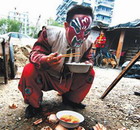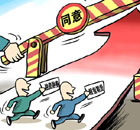Festival gift-giving challenges anti-corruption efforts
(Xinhua)
Updated: 2010-02-21 19:56
 |
Large Medium Small |
At department stores, customers buying shopping cards with money pre-charged on them had to wait in long queues.
The Chinese tradition of presenting gifts to family members and friends during the Lunar New Year has now been extended to sending gifts to officials, which poses new challenges to the country's anti-corruption efforts.
| ||||
It also said that among the 100 bribery cases heard from 2005 to 2007 at the Beijing Dongcheng District People's Court, Beijing Haidian District People's Court and the Beijing No. 1 Intermediate People's Court, 78 officials had accepted bribes during the Lunar New Year period.
Peking University professor Huang Zongliang attributed this phenomenon to bribers trying to "buy over" officials in a non-obvious way and make it easier if they ask for favors in the future.
"Festival gifts are simply bribes in disguise, although bribers may not ask for favors immediately," Huang told Xinhua.
However, nearly half of the officials who took bribes during the Lunar New Year believed the "gifts" should not be considered bribes, according to the Procuratorial Daily report.
Shortly before this new year, a former high-rank official in southwest Chongqing Municipality defended himself at court by saying that the gifts he took for his birthday which coincided with Spring Festival celebrations, should not be considered as bribes.
The official was Wen Qiang, former director of the Chongqing municipal bureau of justice and a key figure in the country's largest gang crackdown. He was found to be in possession of antiques, brand-name watches and an authentic painting worth several million yuan in total.
Huang said the official's argument was just an excuse. "If he did not have power, many would not have bought him birthday gifts."
China's Criminal Law defines bribes as cash or properties officials take in exchange for asked favors abusing their power.
According to the law, bribes worth 5,000 yuan or less could send an official to two years in prison. Those taking more than 100,000 yuan could face more than 10 years in jail, or even life imprisonment.
Traditionally, items such as fine wine, tobacco, tea and brand-name watches would be on officials' gift lists.
New gift ideas in recent years have included pre-charged shopping cards and gifts covering officials' private travel costs.
Corruption watchdogs in China have in the past repeatedly warned officials against taking gifts disguised as bribes during festivals, with some even explicitly listing what items to avoid.
In January, President Hu Jintao, also general secretary of the Communist Party of China (CPC) Central Committee, again called for stricter self-discipline among officials.
In a speech delivered at the Third Plenary Session of the Central Commission for Discipline Inspection, Hu said CPC members must unremittingly improve their mastery of the "Party spirit," meaning that moral and discipline standards should be further raised.
Besides self-discipline, experts believe supervision from both higher level departments and the public should be another tool used to curb corruption.
Li Chengyan, aother professor at Peking University, said the public should be allowed to participate in the appraisal of an official's performance.
Li also believed information of an official's possessions should be made public and people should be encouraged to supervise and report irregularities in officials' private lives.










